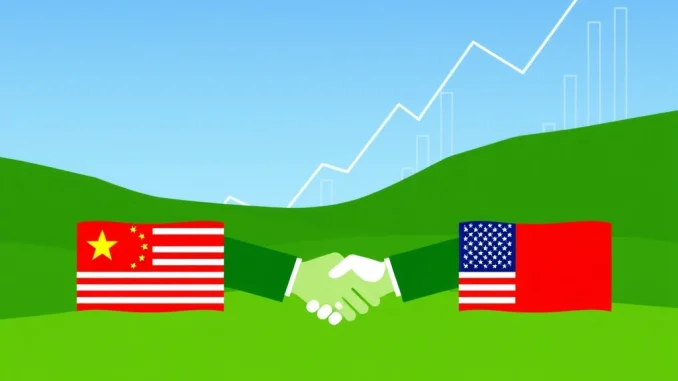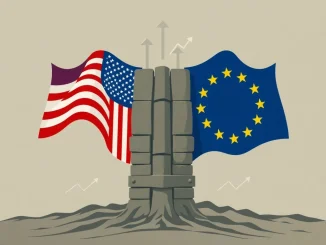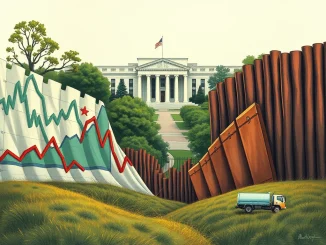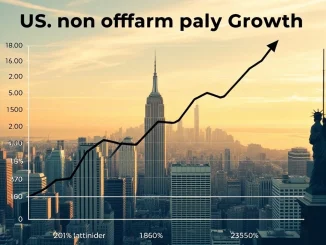
In the ever-evolving landscape of global economics, shifts in major trade relationships can send ripples across markets, including the often-volatile world of cryptocurrencies. Recent comments from a key U.S. official suggest a potential turning point in the long-standing US China tariffs conflict, a development that warrants close attention from anyone tracking the broader economic outlook.
What Did Treasury Secretary Scott Bessent Signal?
U.S. Treasury Secretary Scott Bessent has offered a noteworthy perspective on the trade relationship between the United States and China. According to reports, Bessent described the current tariff situation as “unsustainable.” This isn’t just an observation; it’s a strong indication that the Ues Treasury sees the status quo as detrimental and believes a change is likely.
Crucially, Bessent also clarified the U.S. position, stating that the country is not pursuing a policy of “decoupling” from China. Decoupling implies a complete separation of economies. His statement suggests a preference for managing the relationship, perhaps through “de-risking” – reducing reliance in critical areas without severing all economic ties. This nuanced view is significant for understanding the future trajectory of global trade.
Understanding the US China Tariffs and the Trade War
To appreciate the weight of Bessent’s comments, it’s helpful to recall the origins and impact of the trade war. Initiated primarily during the previous administration, the U.S. imposed significant tariffs on billions of dollars worth of Chinese goods. China retaliated with its own tariffs on U.S. products. The stated goals varied, including addressing trade imbalances, protecting domestic industries, and pressuring China on issues like intellectual property and forced technology transfer.
The conflict has had tangible effects:
- Increased costs for businesses and consumers in both countries.
- Disruptions to global supply chains as companies sought alternatives.
- Reduced certainty for international investment and trade planning.
- Impacts on specific sectors, from agriculture to manufacturing.
This prolonged state of tension is what Secretary Bessent likely refers to as “unsustainable.”
How Easing Tensions Could Impact Global Trade and the Economic Outlook
The prospect of easing US China tariffs could have several positive implications for global trade and the overall economic outlook:
Removing or reducing tariffs could lower import costs, potentially easing inflationary pressures. Businesses could benefit from more predictable supply chains and reduced expenses, while consumers might see lower prices on goods.
A more stable trade relationship between the world’s two largest economies reduces geopolitical and economic uncertainty. This can boost investor confidence and encourage cross-border investment.
With fewer trade barriers, the volume of goods and services traded between the U.S. and China, and potentially globally, could increase, stimulating economic activity.
Why This Economic Outlook Matters for Crypto Investors
While tariffs might seem distant from digital assets, the health and stability of the traditional global economy significantly influence the crypto market. Cryptocurrencies, while decentralized, do not exist in a vacuum. They are affected by macroeconomic factors such as:
- Investor Sentiment: Positive economic news and reduced uncertainty often correlate with increased risk appetite, which can benefit assets like Bitcoin and altcoins. Conversely, fear and instability can lead investors to move towards perceived safer assets or cash.
- Inflation and Currency Strength: Tariffs can impact inflation. Changes in inflation rates and the strength of fiat currencies like the USD can influence the attractiveness of crypto as a hedge or alternative store of value.
- Global Liquidity: Easing trade tensions might contribute to greater global economic activity and liquidity, some of which could flow into digital asset markets.
Therefore, tracking statements from officials like Scott Bessent provides valuable context for understanding the broader economic currents that can influence crypto market dynamics.
Progress on the Horizon?
Adding to the positive sentiment, White House Press Secretary Karoline Leavitt also commented on trade negotiations earlier today. She indicated that President Trump is seeing “good progress” in trade talks, not just with China but with other countries as well. While specific details were not disclosed, this reinforces the idea that active discussions are taking place and progress is perceived by the administration.
The convergence of these statements – the Treasury Secretary highlighting unsustainability and the White House Press Secretary noting progress – paints a picture of a potential shift away from peak trade conflict.
Conclusion: A Potential Tailwind for Markets?
The signals from U.S. Treasury Secretary Scott Bessent regarding the likely easing of US China tariffs represent a significant development in the landscape of global trade. Coupled with the White House’s mention of progress in negotiations, the economic outlook appears cautiously optimistic regarding this particular point of tension. For crypto investors, this isn’t just abstract economic news; it’s a factor that could contribute to a more stable and potentially bullish global market environment. While the details of any tariff adjustments remain to be seen, the stated intention to move away from an “unsustainable” trade war is a powerful indicator of potential positive change.



